Home » World News »
Hate cleric Anjem Choudary returns to Twitter praising Elon Musk
Hate cleric Anjem Choudary returns to Twitter after ban with new account, telling Elon Musk: ‘If you’re true to your word, I’ll keep preaching online’
- Hate cleric Anjem Choudary has returned to Twitter he has told MailOnline
- Choudary, 55, praised Twitter’s new owner Elon Musk for his free speech vow
- His last Twitter account lasted less than five days before he was banned
- He said: ‘If what Elon says about free speech holds true then it should stay up’
Islamic hate preacher Anjem Choudary is back on Twitter and has praised its new owner Elon Musk for giving him the opportunity to reach a global audience.
Choudary, 55, was jailed in 2016 for five-and-a-half years for inviting support for ISIS.
The former lawyer was released from jail on licence having served half of his sentence but was subjected to stringent conditions, including a ban from preaching in person or online.
He was banned permanently from Twitter less than a week after he rejoined the social network in 2019. But now he believes he can resume his career.
Islamic hate preacher Anjem Choudary is back on Twitter and has praised the new owner Elon Musk for giving him the opportunity to reach a global audience
Speaking to MailOnline, Choudary said he will continue preaching online.
When asked if he will be banned again, he replied: ‘Who knows… if what Elon says about free speech holds true then it should stay up.’
The Twitter account has several links to sermons as well as an upcoming online debate being hosted on Telegram.
In a series of tweets posted over the past 24 hours, Choudary criticises the PM Rishi Sunak and condemns the up-coming FIFA World Cup in Qatar.
He also calls on King Charles III to convert to Islam.
Before it was banned, Choudary was a leading member of al-Muhajiroun which was accused of radicalising youths.
Before being jailed, he helped to radicalise Michael Adebolajo and Michael Adebowale, the killers of Fusilier Lee Rigby in South-East London in 2013; and Khuram Butt, the ringleader of the London Bridge attacks of 2017.
Dozens of Choudary’s followers joined ISIS in Syria, including Siddhartha Dhar, also known as Jihadi Sid, who featured in a video showing him executing a victim.
Mohammed Reza Haque, Choudary’s former bodyguard who became known as Jihadi Giant due to his 6ft 6in frame, beheaded a hostage in another propaganda recording.
Choudary, a father-of-five, is understood to have written an autobiography, although is unlikely to make any money from it because he is banned from having a bank account.
Before he was arrested, convicted and locked up, Choudary had become, according to one ex-police chief, the ‘de facto spokesperson for Islamism in the UK’.
Once a leading figure in the now-banned group al-Muhajiroun, he voiced controversial views on Sharia law, while building up a following of thousands through social media, demonstrations and lectures around the world.
Choudary was regularly seen in the media, giving numerous television and newspaper interviews up until his arrest in the autumn of 2014.
But he largely managed to avoid falling foul of the law until he was convicted of inviting support for ISIS.
Choudary was born in north London and studied medicine for a year before he became ‘disenchanted’ and switched to law.
The married father-of-five told jurors at his Old Bailey trial he qualified as a solicitor and opened his own practice.
As he became more religious, practising elements of law troubled him and he decided there was ‘a better path’.
In the 1990s, Choudary became a student of the cleric Omar Bakri Mohammed, learning about Sharia Law and the ‘science of the Koran’.
Choudary was a prolific writer and told his trial that he had joined Twitter two or three years earlier, amassing more than 32,000 followers.
Source: Read Full Article



